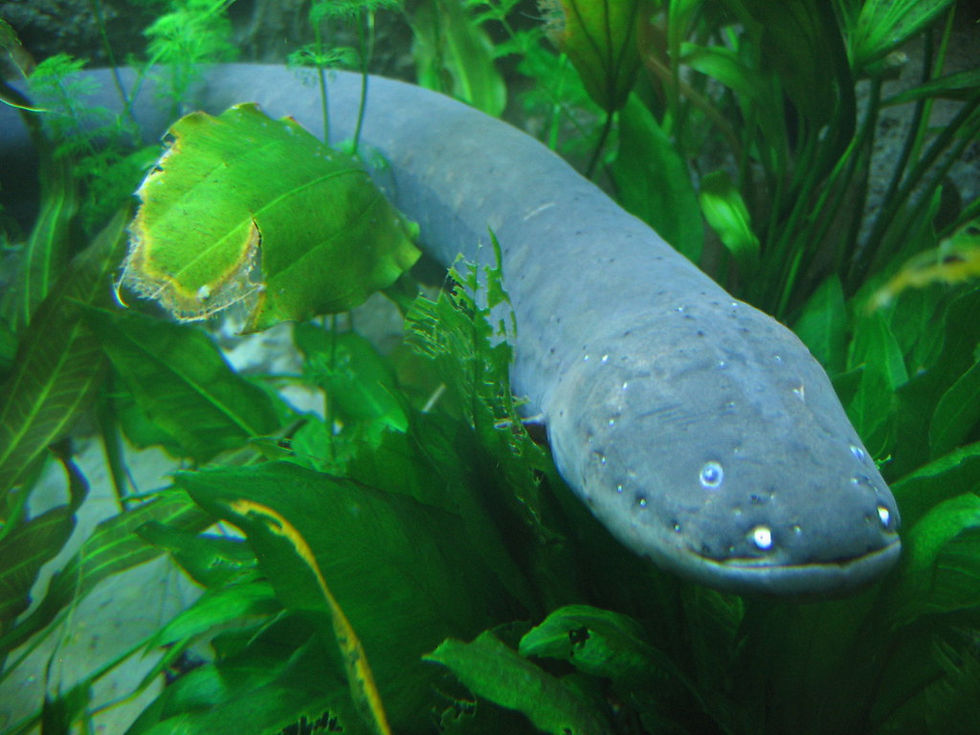Have you ever taken a look around nature and thought that it is magical? With their extraordinary aspects, most phenomena feel out-of-worldly. One example of that is electroreceptive animals. These animals can feel the electric fields around them and utilize them while hunting or communicating (“Electric Animals, When Evolution Amps up.”). While it is already incredible that some animals are able to sense the electric fields, only some fish amongst animals can create electricity. These fish are called electrogenic.
Electric fish can produce electricity at various levels. Depending on their capacity to produce electricity, they are differentiated as weakly and strongly electric fish. Only strongly electric fish are able to produce enough electricity to actually send shockwaves that harm, yet, both of the fish utilize a specialized electric organ that produces electricity. The position of the electric organ differs for each type. These organs contain muscle-like cells called electrocytes that consist of masses of flattened cells stacked as columns(“ELECTRIC ORGANS”). The amount of the electrocytes determines the severity of the electricity(“Generating Electricity: Electric Animals.”). When the animal senses danger or wants to attack, its nervous system sends a signal to the electrocytes. The signals cause sodium ions to enter the cell and create a potential gradient that eventually leads to the discharge of electricity. When the stack of electrocytes is much, they add up to cause higher voltages(“Electric Eels”).

Electrogenic animals use this ability as a sensory tool to replace sight in dark waters. They collect information about their surroundings with their electroreceptors that helps them sense the electric field surrounding them and the changes in it(“How Do Electric Fish Produce Electricity?”).
The real question is “how did they acquire this ability?”
This question is answered with a research at the University of Texas in Austin, US.
Normally, fish contain two copies of the gene that operates sodium channels, which are small motors that use electric signals to control muscle contraction. According to the research, one copy of the sodium channel gene is active in muscles and isn’t in other cells. This yields the creation of a new electric organ(Yazgin, Evrim). This research demonstrated the extremely different expression of the same gene with just a few altercations. Only a variation in 20 DNA molecules long section –which is the section of the sodium channel gene– caused such ability to be acquired by electric fish. Therefore, the evolution of electric fish can be designated as a great example for future references to research on genetics.
The researchers stated that the study with the electric fish helps them find out whether controlling that section of the gene would yield the same result as the animals’ evolution or not (Yazgin, Evrim). This research is a step to help them understand whether the changes done in that specific targeted gene can equate to the thousands of years of evolution or not. The importance of the research is that it is a new step toward understanding genes that may lead to new findings in health through understanding the effects of these regions and what types of changes they can cause.
All in all, this interesting research on the evolution of electric fish demonstrates how interesting biology can be, the cryptic nature of DNAs and genes, and more importantly, what these phenomena mean to science and the future.
Works Cited
(1) Ventana al Conocimiento (Knowledge Window) Scientific journalism Estimated reading time Time 4 to read, et al. “Electric Animals, When Evolution Amps up.” OpenMind, 31 Aug. 2021, https://www.bbvaopenmind.com/en/science/bioscience/electric-animals-evolution-amps-up/.
(2) “ELECTRIC ORGANS” https://www.lkouniv.ac.in/site/writereaddata/siteContent/202003291621086195sudhir_kumar_Electric_organs1.pdf
(3) Let’s Talk Science, and November 27. “Generating Electricity: Electric Animals.” Let’s Talk Science, 27 Nov. 2020, https://letstalkscience.ca/educational-resources/backgrounders/generating-electricity-electric-animals.
(4) “Electric Eels”. https://www.uwa.edu.au/study/-/media/Faculties/Science/Docs/Electric-eels.pdf
(5) “How Do Electric Fish Produce Electricity?” Science ABC, 16 Jan. 2022, https://www.scienceabc.com/nature/animals/how-do-electric-fish-produce-electricity.html.
(6) Yazgin, Evrim. “How Electric Fish Evolved to Flick the Switch on Their Genes.” Cosmos, 5 June 2022, https://cosmosmagazine.com/nature/electric-fish-evolution-genes/.